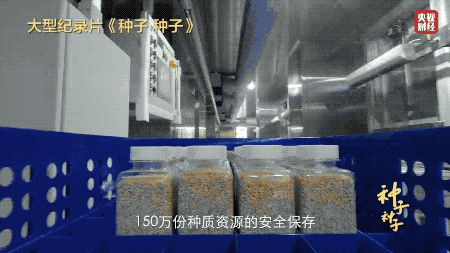There are 280,000 out -of -print resources in this national gear library.
Author:I am a scientist Time:2022.06.15
Refrigerated 100 million crop seeds to prevent crops from extinction. This is "Wandering Earth". Humans are "fire species" preserved in the future of agriculture when facing the doomsday crisis.
But in reality, the seeds saved by humans are far more than 100 million.
According to statistics from the International Seed Alliance (ISF), there are currently 7.4 million plant species resources worldwide. In our country, it has the largest amount of monomer in the world, the strongest preservation capacity, and the most advanced national germination library -the national agricultural crop quality resource library, which can collect 1.5 million resources such as various precious crop seeds.
One seed can change the world. The species library is called more and more people: "Noah's Ark" of the seeds.

It is a kind of quality, not just seeds
Gender> Seed. This is a concept that must be clear.
There is no doubt that the seeds assume the role of reproduction. 90%of the world's edible crops are planted by seeds. So, what about the remaining 10%? What are the crops without seeds to "pass on to generation"?
The concept of "germs" can be answered for this.
Gender resources, also known as genetic resources, generally refer to the genetic material passed to the latter generation from the previous generation. Of course, it can be a seed, but not all plants have seeds, such as ordinary potatoes.
At this time, the gear may also be a "fruit", a "bud", a period of "branches", a group of "pollen" ... they will be selected in the germs of the world's germs.
The biggest role of the germination library is to protect crop diversity. It can retain the crop genes that have disappeared or are about to disappear, and can also provide rich genetic resources for future crop breeding.
Or some people think that this is too exaggerated. But in fact, the ecosystem is sometimes very fragile in the global climate change process. Researchers believe that over 40%of plant species in the world are on the verge of extinction.
In a most popular example, when Academician Yuan Longping cultivates hybrid rice, wild rice has been contributed. But what if the wild rice germplasm resources were not saved at the time? After all, Li Deba, director of the Southwest Wild Biological Gender Resources Library in the southwest of my country, said that in the 1980s, there were wild rice in 26 places in Yunnan, and now there are only two.
For another example, in 1954, Cycusal disease caused a devastating blow in the US soybean industry. American scientists found unique varieties collected from China in the early 20th century -Beijing Little Black Beans, and used the unique disease -resistant genes to eventually cultivate new soybean varieties. Without the previous collection, can they still get rid of this crisis in the same time?
Fortunately, there is no if.
Therefore, for the species library, protecting the past is to protect the future.

"Value" species of quality resources
What kind of germplasm resources can enter the species library?
It requires a "ID card". Qian Qian, an academician of the Chinese Academy of Sciences, once said that genetic difference is an important factor in identifying types of quality resources, but it must also take into account many aspects such as their "face value" and individual size.
Taking rice as an example, there are 158 information in the rice gauge to enter the warehouse, including 28 passport information from the place of origin to the type and the 130 agronomic traits.
Moreover, in general, the quality resources of one year's crops need to be identified by 3 to 5 years before deciding whether to enter the warehouse. It takes 5-7 years to perennial.
Why is it so troublesome? Because there is a significant difference between "new" and "old residents", it is impossible to waste the collection ability of the germination library.
The new database of the country's national farmers' germplasm resources can meet 5,000 species and 1.5 million species, and the preservation capabilities ranks first in the world.
In order to maintain the germplasm resources well, the germ database was made up. From low -temperature preservation, ultra -low temperature preservation, preservation of test tube seedlings, DNA preservation, etc., it covers all kinds of germplasm resource preservation methods in the world, and the storage life can reach 50 years.
For example, crop seeds with a moisture content of 5%to 8%are generally preserved in a low temperature library with -18 ° C and a humidity of less than 50%, which can extend their life span to decades. The germination rate.
Specifies such as potato, sweet potatoes, bananas, strawberries and other non -breeding crops should be stored in the test tube seedlings and ultra -low temperature library. Ultra-low temperature libraries can be frozen quickly with liquid nitrogen at -196 ° C. After decades, they "wake up" and maintain their original vitality.

Potato seeds are very small, only one -sixth of sesame seeds
It is magical that the common potatoes on the market are breeded with blocks (potato). But wild double potatoes have seeds. Huang Sanwen, the Shenzhen Institute of Agricultural Genome, China Academy of Agricultural Sciences, used hybrid seeds to replace potato blocks with hybrid seeds, and released the first generation of high -purity codcope potato self -intersecting and hybrid potato products "You Potato 1".
This hybrid potato planting cost is lower, and it can be promoted by the southern winter idle land. It is expected to do special varieties of feed. This variety has been inscribed by Academician Yuan Longping in 2020. "Potato hybrid seed breeding technology is disruptive innovation and will bring potato green revolution."
Such technological progress is also the significance of the germ collection of germ resources.
At present, 280,000 natural circles have been preserved in the 521,000 species of the national farmers' species quality libraries.
- END -
Help "double carbon" recycled down products coming!

In April of this year, the National Development and Reform Commission, the Ministr...
Very rare!Just tonight!

According to more than ten days after June 16th, before sunrise, Venus, King Star,...